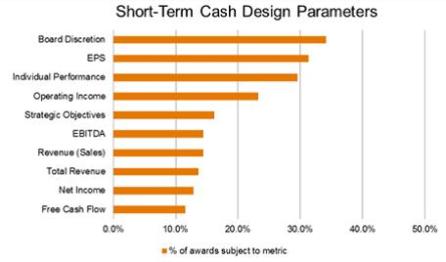Main Data Group generated a study of the Fortune 1000, comparing the most commonly disclosed financial performance metrics for short-term cash awards, long-term cash awards, performance stock awards, performance option awards and performance-accelerated awards. The results are shown below:
7 Most Common Misconceptions Around Exemptions
March 4, 2013 — donhelt1Steve Bruce, writing in the HR Daily Advisor, says even when employers are sincerely trying to comply with the law, many misunderstand or misapply exemptions. He offers the following common mistakes and fallacies regarding FLSA exemptions:
- Employees who are paid a salary are exempt. Exemption decisions are based on the job duties and responsibilities, not on the fact of being paid hourly or by salary. There is a category of employees who are “salaried nonexempt.” These employees are not paid extra for the hours they work over 40 in a week; however, they are due the overtime premium when they work overtime.
- If an employee’s job title is that of manager, supervisor, or administrator, he or she is exempt. Title is not determinative; again, the job duties, not the title, determine the exemption.
- Highly compensated employees are exempt. Highly compensated employees are more likely to be exempt, but that is not the determining factor.
- Employees who are college educated and perform white-collar office work are exempt. Again, job duties, not education or clothing, are the determinates of the exemption.
- Employees who have advanced degrees are exempt. Same story.
- If employees prefer to be paid a salary and do not want to record their time, it is OK to treat them as exempt. Employees can’t give up their rights under the Fair Labor Standards Act. And employers have to maintain their obligations under the Act, including tracking hours worked and paying overtime.
- If employees who have been classified as exempt don’t work overtime, it doesn’t matter if they are misclassified. Perhaps their amount of pay won’t be affected, but the employer will still be violating provisions of the FLSA. For example, the recordkeeping requirements of the FLSA must be adhered to, and there are other tricky situations relating to meal periods, breaks, time off, and leave that will cause trouble (and cost big money) eventually.
Competencies For Sales Compensation Specialists
March 4, 2013 — donhelt1Chad Albrecht, a principal with ZS Associates, believes top sales compensation specialists have to be above average in all of the following (and several more) competencies:
- Analytic Skills: Assessing the health of the plan, not just using feedback from the field, but conducting pay-for-performance analyses and financially modeling the new plan results;
- Written Communication: Developing plan documents, a clear communication plan, and PowerPoint presentations for the plan roll-out;
- Interpersonal Communication: Listening to field input on the plans, interviewing sales leaders on plan effectiveness and possibly presenting the new plan to the field;
- Quality and Attention to Detail: If you make an error in the sales compensation calculation, the sales force will find it; quality of the payout calculations is critical;
- Initiative and Project Management: The sales compensation design process needs an owner who will initiate the process, get meetings on the calendar and do it far enough in advance so that the plan design can be completed and operational by early January; and
- Sales Compensation Expertise: Company leadership will be looking to the sales comp specialist for expertise on the topic, unintended consequences to avoid, etc.
5 Field-Tested Sales Comp Metrics
March 4, 2013 — donhelt1Joseph DiMisa, who is senior vice president, Sales Force Effectiveness, at Sibson Consulting, and author of the best-selling business book, The Fisherman’s Guide to Selling, offered some sales compensation tips during a recent webinar sponsored by BLR and HR Hero. DiMisa suggests compensation pros look at the following metrics:
1. PAR Analysis: Analysis of penetration, acquisition, and retention
2. Pay Differentiation: Ratio of incentive pay to the median
3. Average Pay Composition: Pay composition by component
4. Performance Distributions: Histogram of sales rep performance by a given metric
5. Compensation Cost of Sales: Total compensation (base pay + commissions) for full-year reps/corresponding annualized revenue
5 Pay Practices that Trigger ISS Attention
March 4, 2013 — donhelt1Because the Institutional Shareholder Services reports and positions on executive pay are widely reviewed and considered by investors, comp managers need to be aware of the principal concerns ISS has, says Deborah Lifshey, managing director at Pearl Meyer & Partners. Here are five pay practices that most concern ISS, says Lifshey:
1. Repricing/replacing underwater stock options without shareholder approval
2. Excessive perquisites or tax gross-ups
3. New or extended agreements that provide for:
a. CIC (Change In Control) payments greater than three times base plus bonus
b. Single-trigger CIC payments
c. CIC payments with excise tax gross-ups
4. Incentives that may motivate excessive risk-taking:
a. Multiyear guaranteed bonuses
b. Single or common performance metric used for short- and long-term incentive plans
c. Lucrative severance packages
d. High pay opportunities relative to industry peers
e. Disproportionate supplemental pensions
f. Mega annual equity grants with unlimited upside and no downside risk
5. Options backdating


